SCPEM terms of reference - Attorney-General's Department
SCPEM terms of reference - Attorney-General's Department
SCPEM terms of reference - Attorney-General's Department
You also want an ePaper? Increase the reach of your titles
YUMPU automatically turns print PDFs into web optimized ePapers that Google loves.
COAG Standing Council on Police and Emergency<br />
Management<br />
Terms <strong>of</strong> Reference<br />
COAG Standing Councils are established to:<br />
a) achieve COAG’s strategic themes by pursuing and monitoring priority issues <strong>of</strong> national<br />
significance which require sustained, collaborative effort; and<br />
b) address key areas <strong>of</strong> shared Commonwealth, State and Territory responsibility and funding.<br />
The Standing Council will pursue the following COAG strategic themes as its major focus areas:<br />
1. A Sustainable and Liveable Australia<br />
2. Closing the Gap for Indigenous Australians.<br />
Chair<br />
Membership<br />
Scope <strong>of</strong><br />
Standing<br />
Council<br />
[To be determined at the first meeting <strong>of</strong> the Council] (NB: the predecessor<br />
Ministerial Councils had differing chairing arrangements)<br />
Commonwealth, State, Territory and New Zealand Ministers with responsibility<br />
for police and emergency management matters, and the Australian Local<br />
Government Association.<br />
The purpose <strong>of</strong> the Council is to promote a coordinated national response to law<br />
enforcement and emergency management issues. The Council looks to develop a<br />
shared framework for cooperation and a basis for strategic directions for the<br />
policing and emergency services <strong>of</strong> Australia and New Zealand. The Council also<br />
strives to encourage and share best practice across jurisdictions in police policy<br />
and operations, and in emergency management.<br />
The Council has particular responsibilities for:<br />
<br />
<br />
<br />
<br />
law enforcement issues such as police powers, criminal <strong>of</strong>fences and the<br />
sharing <strong>of</strong> intelligence;<br />
advancement <strong>of</strong> the pr<strong>of</strong>essionalism <strong>of</strong> policing;<br />
national leadership on emergency management (all hazards) and disaster<br />
resilience, including national policies and priorities; and<br />
consideration <strong>of</strong> an annual Serious and Organised Crime Threat<br />
Assessment presented by the Chair <strong>of</strong> the Australian Crime Commission<br />
Board.<br />
The Council will work closely with the Standing Council on Law and Justice to<br />
ensure coordination <strong>of</strong> joint priorities, most notably in the areas <strong>of</strong> organised<br />
crime and cyber crime.
COAG Standing Council on Police and Emergency<br />
Management<br />
Terms <strong>of</strong> Reference<br />
Priority Issues<br />
<strong>of</strong> National<br />
Significance 1<br />
Cross-Cutting<br />
Issues<br />
The Council’s priority issues are:<br />
1. Progressing the National Response to Organised Crime, including illicit<br />
drugs;<br />
2. Progressing a national response to cyber crime;<br />
3. Improving cross-jurisdictional law enforcement cooperation and planning,<br />
including law enforcement systems;<br />
4. Coordinating national initiatives to address alcohol, public safety and<br />
serious crime, including alcohol-fuelled violence, road safety and child<br />
protection;<br />
5. Increasing the resilience <strong>of</strong> individuals and communities to the impacts <strong>of</strong><br />
disasters by undertaking and supporting initiatives that are designed to<br />
encourage all sectors <strong>of</strong> the Australian community to take responsibility<br />
for mitigating the effects <strong>of</strong> disasters, including implementation <strong>of</strong> the<br />
National Strategy for Disaster Resilience; and<br />
6. Consideration <strong>of</strong> recommendations <strong>of</strong> national interest from significant<br />
commissions <strong>of</strong> inquiry into natural disasters, including inquiries into the<br />
recent floods in Queensland and Victoria and bushfires in Western<br />
Australia.<br />
Note: Priorities 1 and 2 also appear as priorities for the Standing Council on Law<br />
and Justice. The project plans will specify the different roles <strong>of</strong> the two Councils.<br />
In pursuing its priority issues <strong>of</strong> national significance, the Council will take into<br />
account the cross-cutting issues <strong>of</strong> Indigenous disadvantage, access to services,<br />
gender equality, and inclusion for persons with disability, as well as the specific<br />
needs <strong>of</strong> regional Australia.<br />
1 Priority issues <strong>of</strong> national significance are reform-focused and warrant oversight by Ministers and by COAG. They will<br />
change over time and do not necessarily encompass all aspects <strong>of</strong> the work <strong>of</strong> the Council.
COAG Standing Council on Police and Emergency<br />
Management<br />
Terms <strong>of</strong> Reference<br />
Legislative and<br />
Governance<br />
Responsibilities<br />
National<br />
Agreements,<br />
National<br />
Partnerships<br />
and Intergovernmental<br />
Agreements<br />
Operations<br />
Decision-<br />
Making<br />
Responsibilities under the following instruments:<br />
Australian Crime Commission Act 2002.<br />
Responsibilities for the following bodies:<br />
Australia New Zealand Policing Advisory Agency;<br />
Australian Institute <strong>of</strong> Police Management (AIPM);<br />
CrimTrac; and<br />
National Crime Statistics Unit.<br />
The Council commits that by July 2016, specific <strong>reference</strong>s to the former<br />
Ministerial Council in the above governing instruments will be changed to refer<br />
instead to the ‘Ministers responsible for […...]’.<br />
Note that the Inter-Governmental Committee for the Australian Crime<br />
Commission will continue to meet to discharge its legislative and governance<br />
obligations under the Australian Crime Commission Act 2002, until such time as<br />
specific <strong>reference</strong>s to this former Ministerial Council are changed.<br />
Responsibilities under the Natural Disaster Resilience National Partnership<br />
Agreement.<br />
COAG considers that, as a general rule, Councils would not require more than two<br />
face to face meetings a year.<br />
Meetings <strong>of</strong> Councils and <strong>of</strong>ficials will utilise the TelePresence network as much<br />
as possible to meet and to transact business, to minimise environmental impacts<br />
and meeting and travel costs.<br />
Other operational arrangements are to be made by the Ministerial Council and do<br />
not require COAG endorsement.<br />
Councils will make decisions on the basis <strong>of</strong> consensus wherever possible, unless<br />
specific voting rules are included in relevant governing instrument(s).<br />
Where necessary, the principle <strong>of</strong> one vote per jurisdiction would apply.
COAG Standing Council on Police and Emergency<br />
Management<br />
Terms <strong>of</strong> Reference<br />
Reporting<br />
The Council will provide COAG with an annual status report, due 31 July, on:<br />
the progress/completion <strong>of</strong> its priority issues against agreed milestones;<br />
the contribution made towards meeting the Closing the Gap targets;<br />
any additional priorities that it believes should be addressed and submitted<br />
for COAG consideration;<br />
key outputs or achievements from other inter-jurisdictional activities; and<br />
decisions taken as a result <strong>of</strong> its legislative or governance responsibilities<br />
and changes made to legislation or agreements.<br />
The Council will also provide a draft work plan for the following financial year<br />
annually by 31 May.
COAG Standing Council on Police and Emergency<br />
Management<br />
Terms <strong>of</strong> Reference<br />
Inaugural Membership<br />
Chairing <strong>of</strong> this Standing Council is to be determined.<br />
Jurisdiction Minister/s Role<br />
Commonwealth The Hon Robert McClelland, <strong>Attorney</strong>-General Member<br />
New South Wales<br />
Victoria<br />
Queensland<br />
Western Australia<br />
South Australia<br />
Tasmania<br />
Australian Capital<br />
Territory<br />
Northern Territory<br />
Australian Local<br />
Government<br />
Association<br />
The Hon Brendan O’Connor, Minster for Home Affairs<br />
The Hon Michael Gallacher, Minister for Police and<br />
Emergency Services<br />
The Hon Peter Ryan, Minister for Police and Emergency<br />
Services<br />
The Hon Neil Roberts, Minister for Police, Corrective and<br />
Emergency Services<br />
The Hon Rob Johnson, Minister for Police and Emergency<br />
Services<br />
The Hon Kevin Foley, Minister for Police; Minister for<br />
Emergency Services<br />
Mr David O’Byrne, Minister for Police and Emergency<br />
Management<br />
Mr Simon Corbell, <strong>Attorney</strong> General; Minister for Police<br />
and Emergency Services<br />
The Hon Paul Henderson, Chief Minister; Minister for<br />
Police, Fire and Emergency Services<br />
Mayor Bob Abbott, Sunshine Coast Regional Council,<br />
Queensland<br />
Member<br />
Member<br />
Member<br />
Member<br />
Member<br />
Member<br />
Member<br />
Member<br />
Member<br />
Member<br />
New Zealand The Hon Judith Collins, Minister <strong>of</strong> Police<br />
Member<br />
OR<br />
The Hon Craig Foss, Minister for Civil Defence<br />
* Where more than one member has been nominated, there will be one vote per jurisdiction


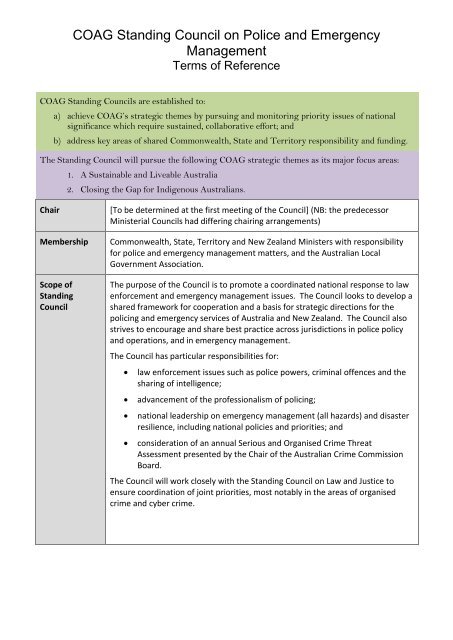

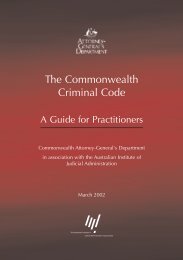
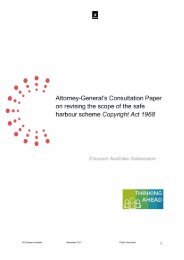

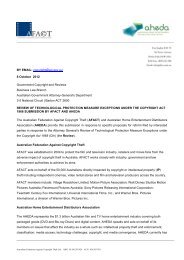

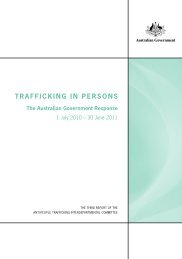
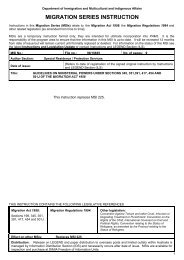
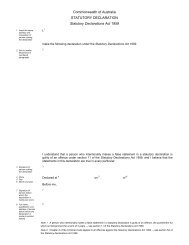

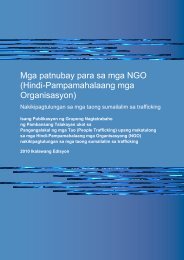
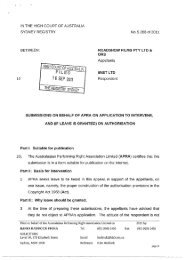

![Normann Witzleb [PDF 657KB] - Attorney-General's Department](https://img.yumpu.com/26247895/1/184x260/normann-witzleb-pdf-657kb-attorney-generals-department.jpg?quality=85)